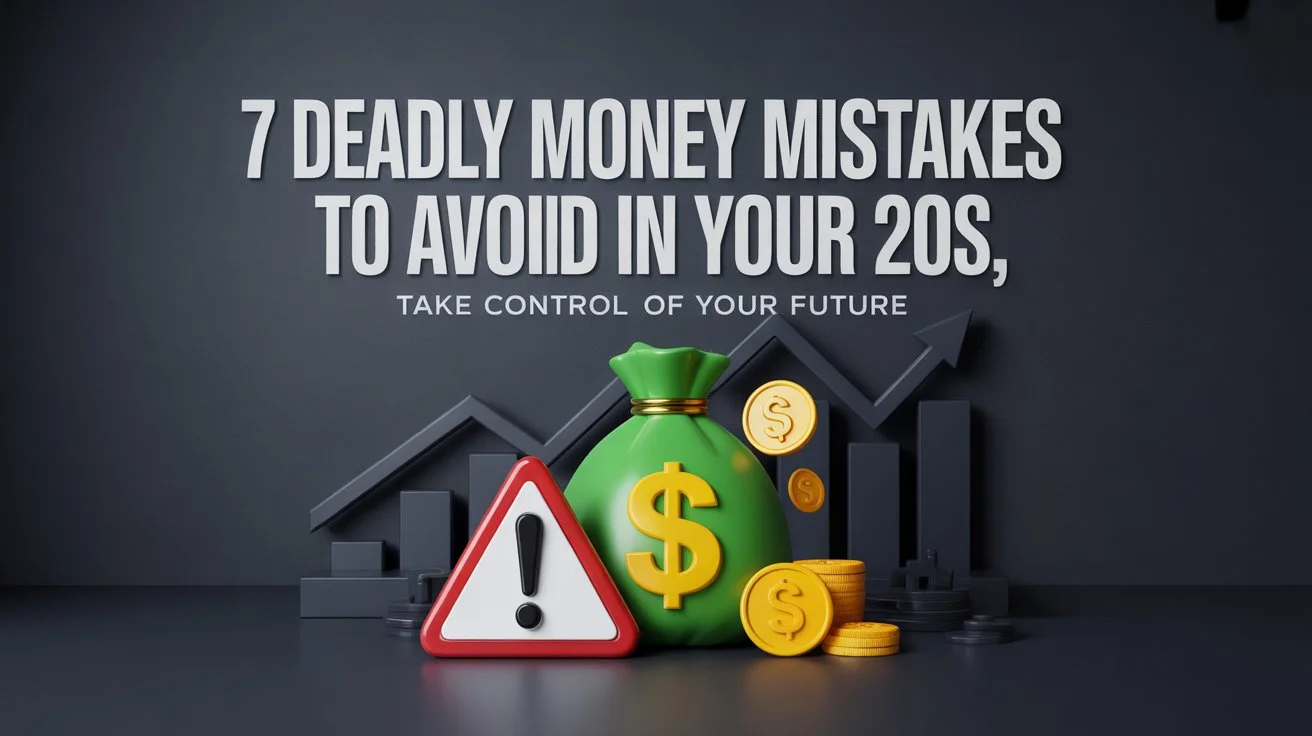Money mistakes to avoid in your 20s
Money mistakes to avoid in your 20s can influence your financial path for many years to come. Exciting, independent, and full of new opportunities, this stage of life is also when many young adults make bad financial decisions that will hinder them in the future. Although they may not seem serious at the moment, common mistakes like putting off investments, overspending on lifestyle, or undervaluing the importance of saving can have long-term consequences.
The best time to start compounding, start saving for emergencies, and develop sound budgeting practices is in your 20s. By making the correct decisions during this time, you can establish a solid foundation for financial independence, manage debt sensibly, and responsibly build credit. You can ensure stability, lessen stress, and put yourself on the path to long-term financial success by knowing the most common financial blunders and how to avoid them. Here are some financial mistakes young adults make.
1: Delaying Investing

One of the most common money mistakes to avoid in your 20s is delaying investing. Many young adults believe they should put off investing until they have more money, a steady job, or have paid off some debt. Years of lost opportunities are frequently the result of this mindset. In actuality, since you have time on your side, your 20s are the ideal age to start. Consistency and patience allow your money to grow significantly through the power of compounding, even if you can only invest small amounts.
If you wait too long, you may have to save much more money later in life to make up the difference, and by then, you might also have other obligations, such as housing or family expenses. Early investing not only increases your wealth but also teaches you important risk management skills and discipline.
Why delaying investing is a big mistake:
- Compound interest, which gradually increases your wealth, is no longer an advantage.
- You will need to save more aggressively later in life if you start late.
- You lose out on the chance to take more significant but controllable risks when you’re younger.
- Early investing fosters long-term financial habits and discipline.
- By retirement, even modest investments made in your 20s can grow into substantial sums.
You give yourself the best chance to become financially independent in the future by avoiding this error and getting started right away.
2: Not having a budget

Living without a budget is another significant money mistake to avoid in your 20s. When they first start working, many young adults spend their paychecks without keeping track of their spending. This leads to a vicious cycle of excessive spending, mounting debt, and little to no savings.
Giving your money a purpose is what a budget is all about, not limiting your life. You can save money, put needs before wants, and still lead a responsible lifestyle with a straightforward plan. Because you always know what you can afford and how much you’re saving for future objectives, having a budget also helps you feel less stressed about money. You run the risk of living paycheck to paycheck without it and losing out on long-term financial growth.
Why it’s expensive to not have a budget:
- Without keeping track of spending, it’s easy to overspend.
- It becomes challenging to save for things like a house, a car, or a trip.
- It is more likely that you will accrue needless debt.
- Living paycheck to paycheck is frequently the result of not having a budget.
- Budgeting aids in striking a balance between financial stability and lifestyle enjoyment.
You can take charge of your finances, eliminate needless stress, and position yourself for long-term financial independence by developing a reasonable budget in your 20s.
3: Ignoring an emergency fund
One of the most overlooked money mistakes to avoid in your 20s, isn’t saving for emergencies. Many young adults believe that they will not experience emergencies or that they can rely on loans, family, or credit cards in the event of unforeseen costs. But life isn’t always predictable.
If you are unprepared, an unexpected medical bill, job loss, or auto repair can throw your finances off balance and put you in debt. Your emergency fund serves as your financial safety net, keeping you on track with your financial objectives and shielding you from needless worry. To provide you with financial stability and peace of mind, your fund should ideally cover three to six months’ worth of necessities.
Why it’s dangerous to neglect an emergency fund:
- You may be forced into high-interest debt by unforeseen expenses.
- Without savings, it becomes more difficult to handle a job loss or a decrease in income.
- You run the risk of postponing other financial objectives, such as debt repayment or investing.
- In times of uncertainty, having an emergency fund offers comfort.
- It assists you in managing unforeseen expenses without relying on credit cards or loans.
It is better to start small than to have no emergency fund at all, even if it is only a few hundred dollars. Building this safety net gradually guarantees financial stability throughout your twenties and beyond.
4: Relying on Credit Cards for Lifestyle Purchases
A very common money mistake to avoid in your 20s is using credit cards excessively to finance their lifestyle choices. Young adults frequently swipe their cards for entertainment, dining out, travel, and shopping without realizing how quickly balances can mount up. Credit card misuse for everyday indulgences frequently results in high-interest debt that is hard to pay off, even though credit cards can be helpful for establishing credit and earning rewards.
In addition to depleting your future earnings, this kind of debt keeps you from investing and saving. Making responsible use of credit cards entails only making purchases you can truly afford and paying off balances in full each month.
Why it’s bad to use credit cards to pay for lifestyle purchases:
- High interest rates have the potential to keep you in debt for a long time.
- Your capacity to save and invest is diminished when you overspend on wants.
- Having a lot of debt lowers your credit score.
- When monthly payments continue to mount, stress levels rise.
- Relying on borrowed funds delays financial independence.
While establishing good credit is important, if you want to use credit cards responsibly in your twenties, you should treat them as convenience tools rather than as free cash for an unsustainable lifestyle.
5: Letting Emotions Drive Financial Decisions
Letting emotions drive your financial decision is one the most common money mistakes to avoid in your 20s. Impulsive spending or bad investment decisions are frequently the result of emotional decision-making. For instance, a lot of young adults try to keep up with their friends’ lifestyles even though they can’t afford them or indulge when they’re stressed.
In the same way, greed can lead you to follow dangerous trends without doing your homework, while fear can cause you to sell during market downturns. In addition to creating financial instability, emotional money management makes it difficult to maintain long-term objectives. Building wealth and financial confidence requires discipline and making decisions based on reason rather than feelings.
Why it’s bad to make emotional financial decisions:
- Spending on the spur of the moment depletes savings and causes regret.
- When investing, fear results in lost chances for long-term growth.
- Greed may lead you to make rash or unplanned financial decisions.
- Budgeting is more difficult to adhere to when emotional money habits are present.
- When financial decisions are poorly considered, stress levels increase.
Making better financial decisions in your twenties can be achieved by developing and following a financial plan.
6: Not continuing financial education
Ignoring the value of continuing financial education is another common financial error that you should avoid in your twenties. When they get a job or open a bank account, many young adults assume that’s enough and stop learning about money management. But the world of finance is always changing, and it can be very costly to be ignorant.
Financial literacy is a lifelong skill that has a direct impact on your wealth, from new investment opportunities and budgeting apps to changes in taxes and interest rates. You run the risk of making the same mistakes again, getting into debt traps, or losing out on chances to increase your wealth if you don’t keep learning. You can avoid scams, make better decisions, and gain confidence in your ability to manage your money with the help of financial education.
Why not continuing financial education is a mistake:
- Lack of knowledge can lead to poor financial decisions.
- You may miss opportunities like investing, saving strategies, or side hustles.
- Staying uninformed increases the risk of falling into debt traps.
- Continuous learning builds confidence in handling money.
- Financial literacy is the foundation of long-term independence.
By dedicating time to books, podcasts, online courses, or financial mentors, you can keep upgrading your knowledge and make better money choices in your 20s and beyond.
7: Skipping retirement contributions
A critical money mistake to avoid in your 20s is skipping retirement contributions because retirement feels too far away When they earn more money in their 30s or 40s, many young adults believe they can begin saving, but they miss out on years of compound growth because they wait. The fact is that by the time you retire, even modest contributions made in your twenties can add up to a sizable nest egg.
For instance, compounding over decades can increase an investment of $100 per month in your 20s to hundreds of thousands of dollars. In contrast, waiting even ten years to begin necessitates significantly higher monthly contributions in order to achieve the same objective. You become more reliant on other people or on erratic sources of income as you age if you neglect your retirement savings.
Why it’s a bad idea to skip retirement contributions:
- Decades of compound growth are lost.
- If you wait longer, you will eventually need to save much more money.
- Planning for retirement becomes more uncertain and stressful.
- You lose out on tax breaks and employer-sponsored programs.
- Massive long-term wealth can be created with modest early contributions.
You can give yourself the gift of financial independence and retirement peace of mind by starting early, even with small contributions.
Conclusion: Money mistakes to avoid in your 20s
Understanding the money mistakes to avoid in your 20s is the initial stage of creating a stable financial future. The biggest financial mistakes young adults make
frequently result from a lack of preparation, emotional outbursts, and disregard for long-term objectives. Rather than slipping into common financial traps in your 20s, In your twenties, concentrate on developing sound financial practices that will position you for success.
Let’s start with the fundamentals: Make a spending plan and stay away from budgeting mistakes in your 20s by keeping tabs on each dollar. To maintain control, learn how to efficiently track your finances using spreadsheets or apps. Put savings first because why you need an emergency fund in your 20s is straightforward—it shields you from unforeseen shocks without incurring debt. Prioritize retirement as well; the best time to make small contributions is now.
tips for saving for retirement in your 20s, Make good use of credit, as credit card mistakes to avoid as a beginner can postpone achieving financial independence.
You can avoid regrets, accumulate wealth early, and experience financial independence earlier than most by adhering personal finance tips to young adults. Spending is only one aspect of your twenties; another is setting the groundwork for a lifetime of prudent money management.
Frequently Asked Questions:
Q: What should I be doing with my money in my 20s?
Focus on creating an emergency fund, paying off debt, investing early, budgeting, and forming wise financial habits in your 20s to lay the groundwork for long-term financial success.
Q: What are the biggest financial mistakes young adults make?
The most common errors are relying too heavily on credit cards, putting off investing in their twenties, overspending, and ignoring savings.
Q: Why do I need an emergency fund in my 20s?
You can avoid debt by having an emergency fund to cover unforeseen costs like medical bills or job loss.
Q: What credit card mistakes should beginners avoid?
Avoid late payments, excessive spending, and carrying balances as these can lower your credit score.
Q: What are the most common budgeting mistakes in your 20s?
Not keeping track of your spending, going over your income, and not making emergency or savings plans.







